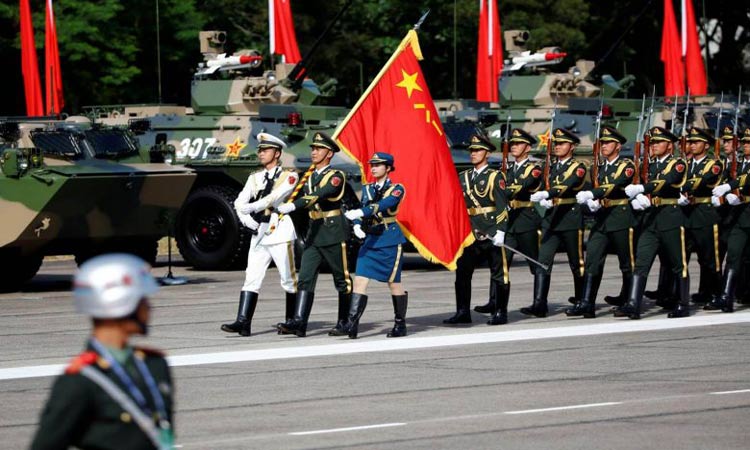China, the world's second largest military spender after the US, Tuesday announced a 7.5 per cent increase in its defence budget for this year, hiking it to a whopping USD 177.61 billion, over three times that of India.
The 2019 defence budget will be 1.19 trillion yuan (about USD 177.61 billion), according to a draft budget report submitted by Chinese Premier Li Keqiang at the opening of the annual session of China's Parliament, the National People's Congress (NPC), on Tuesday.
The increase this year is lower than that of last year's 8.1 per cent which amounted to USD 175 billion. Last year in yuan terms China had allocated 1.11 trillion yuan.
China, which increased its defence budget in double digits till 2015, has been lowering it to single digit hikes since 2016.
China's budgeted defence spending growth rate stood at 7.6 per cent in 2016, 7 per cent in 2017 and 8.1 per cent in 2018 as its economy too has been steadily slowing down after a double-digit growth in 2010.
With this year's increase, China's defence spending moved closer to the USD 200 billion mark, making it the highest spender on defence after the United States.
India's defence budget this year was increased by 6.87 per cent to Rs 3.18 lakh crore against last year's allocation of Rs 2.98 lakh crore, notwithstanding expectations of a major hike when China and Pakistan were bolstering their military capabilities.
Premier Li, who readout a 40-page work report of his government during the inaugural session of the NPC on Tuesday spoke about continued efforts of China to strengthen the military in terms of weaponry and training besides emphasising on "political loyalty" of the armed forces to President Xi Jinping and the ruling Communist Party of China (CPC).
"Our work to develop national defence and armed forces guided by Xi Jinping's thinking on strengthening the military. We will further do efforts to ensure the political loyalty of the armed forces, strengthen through reform, science and technology and run them in accordance with law," he said.
"We will observe fundamental principle and system of absolute party leadership over the armed forces and fully enforce the system of ultimate responsibility resting with the chairman of the Central Military Commission (CMC)," he said.
Xi regarded as the most powerful leader after Mao Zedong heads the CPC, the CMC is the overall military high command of the People's Liberation Army (PLA) and the Presidency.
The Chinese military works under the command of the party not the government.
In recent years, China has resorted to major reforms of its military, which included giving priority to expand its navy and air force to enhance its influence abroad, while cutting down three lakh troops of the People's Liberation Army (PLA).
Even after the cuts, the PLA is the world's biggest military with two million personnel in its ranks.
Chinese President Xi, who has vowed to turn the PLA into a "world class" military by mid-century, has repeatedly called on the Army to be combat-ready.
The hike in the military spending comes as Beijing steps up its efforts to assert its vast territorial claims in the disputed South China Sea.
Describing China's defence budget increases in recent years as reasonable and appropriate, NPC spokesman Zhang Yesui said on Monday that the raise aimed to "meet the country's demand in safeguarding national security and military reform with Chinese characteristics".
"Whether a country is a military threat to others or not is not determined by its increase in defence expenditure, but by the foreign and national defence policies it adopts," he said.
Compared to other countries, China's defence budget accounted for 1.3 per cent of the GDP, while major developing countries spent two per cent GDP on their defence, Zhang added.
As part of the new policy, China now has one aircraft carrier, another undergoing trial and the third one under construction.
The state media reported that China planned to have five aircraft carriers in the near future with plans to build nuclear carriers like the US. It is also rapidly adding new naval ships and submarines.
Beijing also claimed to have developed a new range of missiles and weapons systems in recent years, including stealth aircraft.

